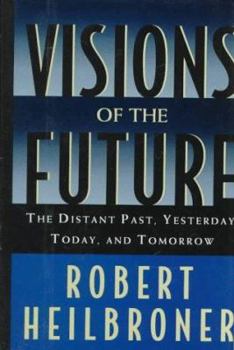Visions of the Future: The Distant Past, Yesterday, Today, and Tomorrow
Select Format
Select Condition 
Book Overview
"This is an exceedingly long short book, stretching at least fifty thousand years into the past and who knows how many into the future..." So begins Visions of the Future, the prophetic new book by eminent economist Robert Heilbroner. Heilbroner's basic premise is stunning in its elegant simplicity. He contends that throughout all of human history, despite the huge gulf in social organization, technological development and cultural achievement that divides us from the earliest known traces of homo sapiens, there have really only been three distinct ways of looking at the future. During a period Heilbroner refers to simply as the Distant Past, stretching from prehistory to the appearance of modern nation-states in seventeenth century Europe, there was no notion of a future measurably and materially different from the present or the past. From the Stone Age to the Bronze, Mesopotamia and Egypt to Greece and Rome, and throughout the Middle Ages, a continuum of cultures and civilizations shared one defining characteristic, and that was the absence of any expectation of material progress for the great masses of people.
Heilbroner maintains that it was not until the first stirrings of the period he refers to as Yesterday, spanning from roughly 1700 to 1950, that the future entered into human consciousness as a great beckoning force. Capitalism, continually reinvigorated by the seemingly endless forward march of science and an evolving sense of democracy, appeared to promise all levels of society some expectation of a future at least somewhat better than the past. It was this unwavering faith in the superiority of the future that separated Yesterday from the age we have now entered. While we are still driven towards tomorrow by the same forces that determined the recent past, the lessons of Hiroshima and Chernobyl, the chaos in the former Soviet Union, the stagnation of the West, and the anarchic rage unleashed in our inner cities and in hot spots around the globe have brought on a palpable anxiety that is quite apart from both the resignation of the Distant Past or the bright optimism of Yesterday.
In a brilliant conclusion drawing together the threat of nuclear blackmail, global warning and the growing commodification of life represented by video games, voice mail, and VCRs, Visions of the Future issues a clarion call to face the challenges of the twenty-first century with a new awareness and resolve, a resolve strengthened by the inspiration of our collective past.
Heilbroner maintains that it was not until the first stirrings of the period he refers to as Yesterday, spanning from roughly 1700 to 1950, that the future entered into human consciousness as a great beckoning force. Capitalism, continually reinvigorated by the seemingly endless forward march of science and an evolving sense of democracy, appeared to promise all levels of society some expectation of a future at least somewhat better than the past. It was this unwavering faith in the superiority of the future that separated Yesterday from the age we have now entered. While we are still driven towards tomorrow by the same forces that determined the recent past, the lessons of Hiroshima and Chernobyl, the chaos in the former Soviet Union, the stagnation of the West, and the anarchic rage unleashed in our inner cities and in hot spots around the globe have brought on a palpable anxiety that is quite apart from both the resignation of the Distant Past or the bright optimism of Yesterday.
In a brilliant conclusion drawing together the threat of nuclear blackmail, global warning and the growing commodification of life represented by video games, voice mail, and VCRs, Visions of the Future issues a clarion call to face the challenges of the twenty-first century with a new awareness and resolve, a resolve strengthened by the inspiration of our collective past.
Format:Hardcover
Language:English
ISBN:0195090748
ISBN13:9780195090741
Release Date:January 1995
Publisher:Oxford University Press, USA
Length:144 Pages
Weight:0.75 lbs.
Dimensions:0.5" x 5.8" x 8.6"
Customer Reviews
2 ratings
Tour-de-force.
Published by Thriftbooks.com User , 22 years ago
In this small book Robert Heilbroner succeeds in summarizing his vision on the history of mankind from the beginning to the ... future."Resignation sums up the Distant Past's vision of the future, hopefulness was that of Yesterday; and apprehension is the dominant mood of Today." (p.69)His analyses are succinct, clear and on target.His vision for tomorrow and after is more speculative:"a spectrum of capitalisms is the most probable political setting for the Western world over the coming of the next century, but that ultimately capitalism will exhaust its vitality, perhaps making way in some societies for a more egalitarian society and in others for more centralized and controlledones." (p.115)I believe that capitalism will continue to be the dominant economic system in the far future, but that the proceeds of the successes of capitalism will be better distributed under the pressure of the democratic process.But I agree with the author that in order to 'save' our planet, we need a stabilization of the population of the globe and a better protection of the environment.A small, but important and stimulating book. Not to be missed.
A different vision of our visions.
Published by Thriftbooks.com User , 28 years ago
Robert Heilbroner has again proven the insight which has made him one of the twentieth century's greatest economic minds. Now, Heilbroner has turned from ecnomy and focused his intellect on human perception of the future. He categorizes human history into four major eras: Distant Past, Yesterday, Today, and Tomorrow. He then goes on to illustrate how each era perceived the future and what it would bring. Using this, Heilbroner then postulates how our perception has changed and what the future may hold





